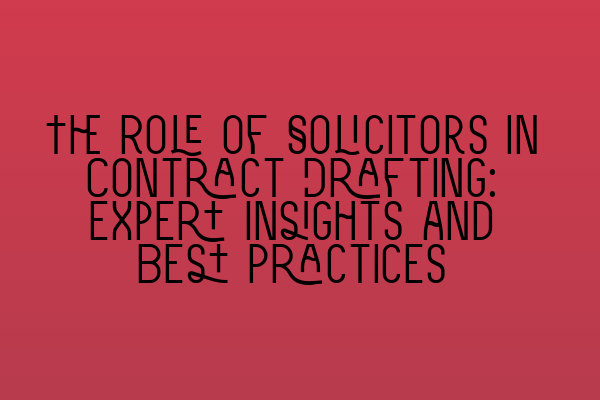The Role of Solicitors in Contract Drafting: Expert Insights and Best Practices
Contracts are the backbone of business transactions, providing a legally binding framework that governs relationships and protects parties involved. To ensure the enforceability and effectiveness of contracts, solicitors play a vital role in contract drafting. In this article, we will delve into the expert insights and best practices that solicitors bring to the table when it comes to creating sound and reliable contracts.
The Importance of Solicitors in Contract Drafting
When it comes to contract drafting, having a solicitor by your side can make all the difference. Their expertise and understanding of the law allow them to navigate through the intricate details and ensure that all necessary elements are included. With the complexity of legal language, it is crucial to have a solicitor who can interpret and draft contracts with precision.
By actively working with their clients, solicitors can identify the specific needs and objectives of each party involved. This collaborative approach allows them to customize contracts to meet the unique requirements of the situation, minimizing the risk of misunderstandings or disputes.
Additionally, solicitors have an in-depth knowledge of legal precedents and case laws. This enables them to incorporate relevant clauses and safeguards that protect their clients’ interests. Through their experience, solicitors can anticipate potential pitfalls and include provisions that address and mitigate those risks.
Expert Insights from Solicitors
We reached out to solicitors specializing in contract law to provide us with their expert insights and best practices. Here are some key takeaways:
1. Understanding the Parties Involved
A crucial starting point in contract drafting is to have a complete understanding of the parties involved. Solicitors stress the importance of researching and gathering information about the individuals or companies entering into the contract. This includes their legal status, financial stability, and reputation. By obtaining this information, solicitors can tailor the contract to address any specific risks associated with the parties.
Link: SQE Sample Papers: Practice for Exam Success
2. Clear and Concise Language
One of the primary responsibilities of solicitors in contract drafting is to ensure that the language used is clear and concise. Legal jargon can often lead to confusion and misinterpretation, so solicitors aim to simplify the wording while still maintaining its legal effectiveness. By using plain language, solicitors minimize the risk of disputes arising from ambiguous provisions.
Link: Adjusting Strategy Based on Mock Performance: Improving Your Approach
3. Thoroughly Addressing Terms and Conditions
In contract drafting, solicitors emphasize the need to address all terms and conditions in a comprehensive manner. This includes clearly defining obligations, rights, and responsibilities of each party involved. Solicitors pay careful attention to potential loopholes or gaps that may arise and ensure that they are adequately covered within the contract to avoid any future disputes.
4. Consideration of Risk Allocation
Solicitors understand the importance of risk allocation in contract drafting. They consider various scenarios and assess the potential risks associated with each party’s obligations. By incorporating appropriate indemnification and limitation of liability clauses, solicitors aim to protect their clients from unnecessary exposure to risks.
Link: Strengthening Weak Areas in SQE: Targeted Practice for Improvement
5. Continuous Review and Updates
Contracts are living documents that need to be periodically reviewed and updated to remain relevant and effective. Solicitors recommend that clients engage in regular reviews of their contracts to ensure compliance with changes in laws or business practices. By keeping contracts up to date, parties can prevent potential legal complications in the future.
Link: Effective Revision Techniques for SQE: Maximizing Retention and Recall
Best Practices in Contract Drafting
Beyond the insights provided by solicitors, there are several best practices that can enhance the effectiveness of contract drafting:
1. Collaboration and Communication
Effective contract drafting requires open and clear communication between the solicitor and the client. The solicitor should actively listen to the client’s needs and objectives, clarifying any uncertainties along the way. Through collaboration, both parties can work towards creating a contract that accurately reflects their intentions.
2. Research and Due Diligence
Prior to drafting a contract, solicitors must conduct thorough research and due diligence. This includes examining relevant laws and regulations, case laws, and industry practices. By staying informed, solicitors can make informed decisions and advise their clients on the most appropriate provisions for their contracts.
3. Adapting to Specific Situations
Contracts are not one-size-fits-all documents. Solicitors must be adaptable to the specific circumstances of each contract they draft. By tailoring contracts to individual situations, solicitors can create agreements that address the unique needs and risks of the parties involved.
4. Professional Language and Tone
While it is important to use clear and concise language, a contract must also maintain a professional and formal tone. Solicitors must strike a balance between simplicity and the legally binding nature of the document. This ensures that the contract is taken seriously and holds weight in legal proceedings.
5. Continuous Professional Development
Lastly, solicitors must stay updated with changes in contract law and industry practices. Continuous professional development and staying informed about new legal precedents and regulations enable solicitors to provide the best possible advice and guidance to their clients.
Link: Improving Speed and Accuracy in SQE: Tips for Efficient Exam Taking
Conclusion
The role of solicitors in contract drafting is invaluable. Their expertise and knowledge of contract law allow them to create legally sound agreements that protect the interests of their clients. By following best practices and incorporating expert insights, solicitors ensure that contracts are clear, comprehensive, and enforceable.
